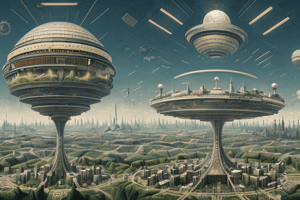Podcast
Questions and Answers
Match the following literary devices with their definitions:
Match the following literary devices with their definitions:
Foreshadowing = A warning or indication of a future event Irony = The expression of one's meaning by using language that normally signifies the opposite, typically for humorous or emphatic effect Satire = Use of humor, irony, exaggeration, or ridicule to expose and criticize people's stupidity or vices, particularly in the context of contemporary politics and other topical issues Allegory = A story, poem, or picture that can be interpreted to reveal a hidden meaning, typically a moral or political one
Match the following literary elements with their definitions:
Match the following literary elements with their definitions:
Theme = The subject of a talk, a piece of writing, a person's thoughts, or an exhibition; a topic Tone = The general character or attitude of a place, piece of writing, situation, etc Imagery = Visually descriptive or figurative language, especially in a literary work, involving metaphors and/or similes Propaganda = Information, especially of a biased or misleading nature, used to promote or publicize a particular political cause or point of view
Match the following literary terms with their definitions:
Match the following literary terms with their definitions:
Simile = A figure of speech that compares two otherwise dissimilar things, often introduced by the words like or as Metaphor = When a word is used in place of another to suggest a likeness Utopia/dystopia = Perfect and fair, Not perfect and unfair Cliche = An overused phrase or expression
Match the following literary devices with their descriptions:
Match the following literary devices with their descriptions:
Flashcards are hidden until you start studying



